Unit2 Topic1 Pollution causes too many problems 学案6(仁爱版九年级上)
仁爱版九上《Topic 1 Pollution causes too many problems》word教案
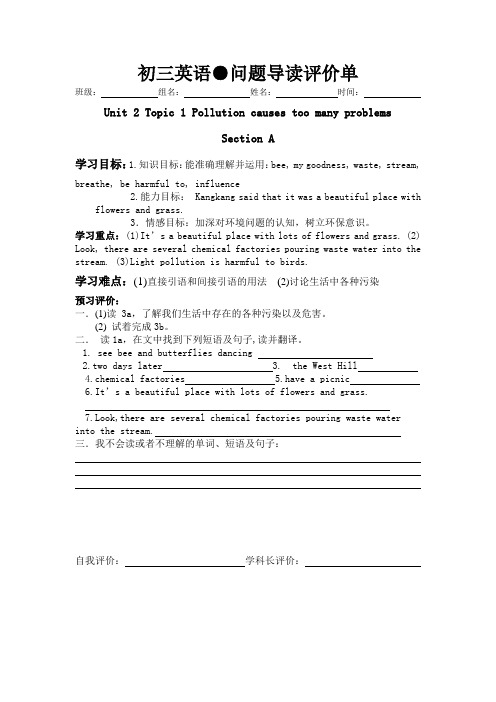
班级:组名:姓名:时间:Unit 2 Topic 1 Pollution causes too many problemsSection A学习目标:1.知识目标:能准确理解并运用:bee, my goodness, waste, stream,breathe, be harmful to, influence2.能力目标: Kangkang said that it was a beautiful place withflowers and grass.3.情感目标:加深对环境问题的认知,树立环保意识。
学习重点:(1)It’s a beautiful place with lots of flowers and grass. (2)Look, there are several chemical factories pouring waste water into thestream. (3)Light pollution is harmful to birds.学习难点:(1)直接引语和间接引语的用法(2)讨论生活中各种污染预习评价:一.(1)读 3a,了解我们生活中存在的各种污染以及危害。
(2)试着完成3b。
二.读1a,在文中找到下列短语及句子,读并翻译。
1. see bee and butterflies dancing2.two days later3. the West Hill4.chemical factories5.have a picnic6.It’s a beautiful place with lots of flowers and grass.7.Look,there are several chemical factories pouring waste waterinto the stream.三.我不会读或者不理解的单词、短语及句子:自我评价:学科长评价:班级:组名:姓名:时间:Unit 2 Topic 1 Pollution causes too many problemsSection A各位同学请根据预习内容,在单位时间内进行系统思考后,认真完成下列题目,并在小组内充分交流,经过合作探究后,准备多元化展示。
Unit2 Topic1 Pollution causes too many problems 教案1(仁爱版九年级上)

九年级上仁爱版英Unit 2 Topic 1 Pollution causes too many problemsSection A教学设计The main activities are 1a and 3a. 本课重点活动是1a和3a。
Ⅰ. Teaching aims and demands 教学目标1. Learn some new words and expression:bee, my goodness, several, waste, stream, breathe, influence2. Learn direct speech and indirect speech.Kangkang said that it was a beautiful place with flowers and grass.3. Learn about different kinds of pollution:(1) Air pollution makes people sick.(2) Light pollution is harmful to our eyes.(3) Litter influences the look of our cities.Ⅱ. Teaching aids 教具录音机/图片/小黑板Ⅲ. Five-finger Teaching Plan 五指教学方案Step 1 Review 第一步复习(时间:2分钟)1. (通过对第一单元的复习,导入被污染的西山景象,用课本中的图画来引出新词汇。
) T: Last unit, we have learned some changes in our hometown. Can you say some?S1: The roads are wider.S2: The buildings are higher and higher.S3: The living conditions have improved…S4: …T: Yes. Many changes have happened in our hometown. Let’s look at the two pictures about West Hill.Step 2 Presentation 第二步呈现(时间:15分钟)T: Are there any differences between them?Ss: Yes.T: Let’s look at Picture 1. What can you see on West Hill in the past?S5: I can see some flowers and grass.S6: I can see a butterfly dancing.T: Yes, there is a butterfly dancing.T: What else can you see?S7: I can see a rabbit.S8: I can see some houses.S9: …T: (指着一蜜蜂)What’s it?Ss: 蜜蜂。
初中英语九年级Unit 2 Love Our Planet Topic 1 Pollution - causes too many problems教案附教学反思
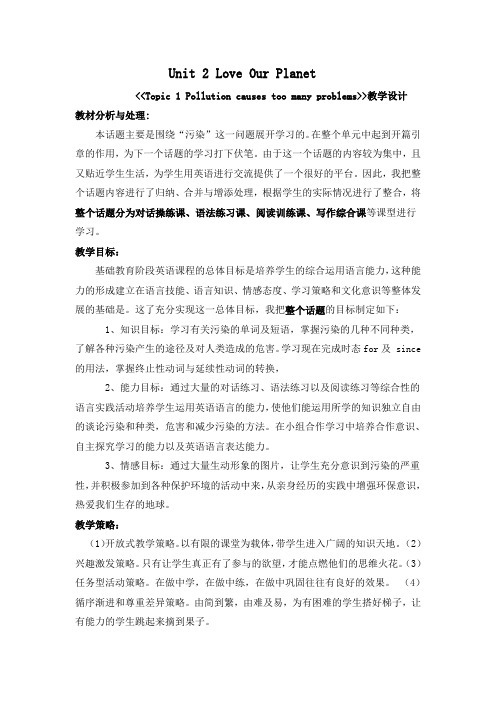
Unit 2 Love Our Planet<<Topic 1 Pollution causes too many problems>>教学设计教材分析与处理:本话题主要是围绕“污染”这一问题展开学习的。
在整个单元中起到开篇引章的作用,为下一个话题的学习打下伏笔。
由于这一个话题的内容较为集中,且又贴近学生生活,为学生用英语进行交流提供了一个很好的平台。
因此,我把整个话题内容进行了归纳、合并与增添处理,根据学生的实际情况进行了整合,将整个话题分为对话操练课、语法练习课、阅读训练课、写作综合课等课型进行学习。
教学目标:基础教育阶段英语课程的总体目标是培养学生的综合运用语言能力,这种能力的形成建立在语言技能、语言知识、情感态度、学习策略和文化意识等整体发展的基础是。
这了充分实现这一总体目标,我把整个话题的目标制定如下:1、知识目标:学习有关污染的单词及短语,掌握污染的几种不同种类,了解各种污染产生的途径及对人类造成的危害。
学习现在完成时态for及 since 的用法,掌握终止性动词与延续性动词的转换,2、能力目标:通过大量的对话练习、语法练习以及阅读练习等综合性的语言实践活动培养学生运用英语语言的能力,使他们能运用所学的知识独立自由的谈论污染和种类,危害和减少污染的方法。
在小组合作学习中培养合作意识、自主探究学习的能力以及英语语言表达能力。
3、情感目标:通过大量生动形象的图片,让学生充分意识到污染的严重性,并积极参加到各种保护环境的活动中来,从亲身经历的实践中增强环保意识,热爱我们生存的地球。
教学策略:(1)开放式教学策略。
以有限的课堂为载体,带学生进入广阔的知识天地。
(2)兴趣激发策略。
只有让学生真正有了参与的欲望,才能点燃他们的思维火花。
(3)任务型活动策略。
在做中学,在做中练,在做中巩固往往有良好的效果。
(4)循序渐进和尊重差异策略。
由简到繁,由难及易,为有困难的学生搭好梯子,让有能力的学生跳起来摘到果子。
九年级英语 Unit 2 Topic 1 Pollution causes too many problems知识精讲(1) 湘教版
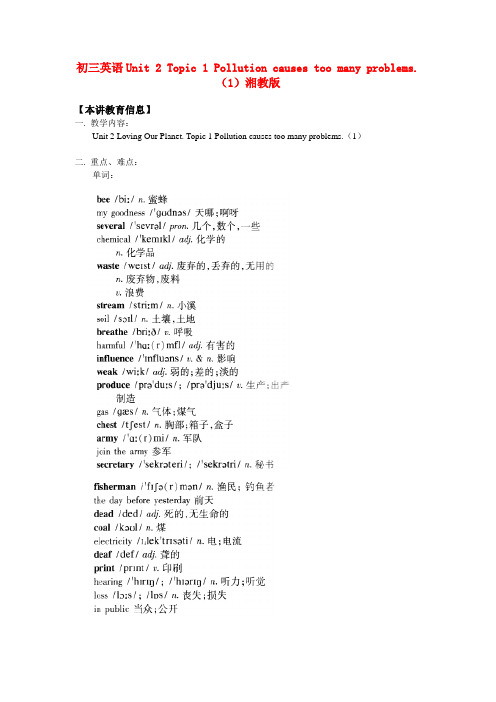
初三英语Unit 2 Topic 1 Pollution causes too many problems.(1)湘教版【本讲教育信息】一. 教学内容:Unit 2 Loving Our Planet. Topic 1 Pollution causes too many problems.(1)二. 重点、难点:单词:三. 句子讲解:语法:现在完成时(III)常用词组:pour…into…write…to…join the army the day before yesterday be harmful to for example quite a few hearing loss no better than in publicdo great harm to high blood pressure重点句型:All the flowers, grass and fish have gone!Look, there are several chemical factories pouring waste water into the streams.How long have you been like this? I’ve been like this since last month.Anyway, I’ll manage to leave this place.Bobby has been away from the park for two hours.His secretary borrowed this book several days ago.It can even cause them to become sick or deaf.交际用语:Oh, my goodness!Of course not.Granny, you look so weak.That sounds terrible!I can’t stand the environment here.语法精粹:现在完成时态(III):for + 一段时间;since+ 时间的一个点。
仁爱版英语九年级上册说课稿Unit2Topic1
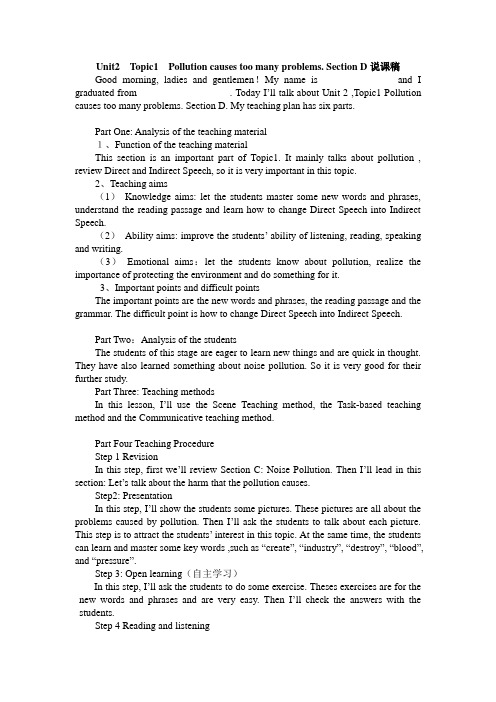
Unit2 Topic1 Pollution causes too many problems. Section D说课稿Good morning, ladies and gentlemen!My name is _______________and I graduated from __________________. Today I’ll talk about Unit 2 ,Topic1 Pollution causes too many problems. Section D. My teaching plan has six parts.Part One: Analysis of the teaching material1、Function of the teaching materialThis section is an important part of Topic1. It mainly talks about pollution , review Direct and Indirect Speech, so it is very important in this topic.2、Teaching aims(1)Knowledge aims: let the students master some new words and phrases, understand the reading passage and learn how to change Direct Speech into Indirect Speech.(2)Ability aims: improve the students’ ability of listening, reading, speaking and writing.(3)Emotional aims:let the students know about pollution, realize the importance of protecting the environment and do something for it.3、Important points and difficult pointsThe important points are the new words and phrases, the reading passage and the grammar. The difficult point is how to change Direct Speech into Indirect Speech.Part Two:Analysis of the studentsThe students of this stage are eager to learn new things and are quick in thought. They have also learned something about noise pollution. So it is very good for their further study.Part Three: Teaching methodsIn this lesson, I’ll use the Scene Teaching method, the Task-based teaching method and the Communicative teaching method.Part Four Teaching ProcedureStep 1 RevisionIn this step, first we’ll review Section C: Noise Pollution. Then I’ll lead in this section: Let’s talk about the harm that the pollution causes.Step2: PresentationIn this step, I’ll show the students some pictures. These pictures are all about the problems caused by pollution. Then I’ll ask the students to talk about each picture. This step is to attract the students’ interest in this topic. At the same time, the students can learn and master some key words ,such as “create”, “industry”, “destroy”, “blood”, and “pressure”.Step 3: Open learning(自主学习)In this step, I’ll ask the students to do some exercise. Theses exercises are for the new words and phrases and are very easy. Then I’ll check the answers with the students.Step 4 Reading and listeningThis step has 3 tasks.Task 1 is fast reading. I’ll ask the students to read the text quickly and find out how many problems are talked about. This can train the students to find information quickly.Task 2 is careful reading. I’ll ask the students to read the text carefully and do some True or False exercises. This can help the students to find details.Task 3 is pair work. I’ll design a form. The students are asked to listen to the text part by part and finish the task. They can work in pairs. This can help the students understand the text deeply and clearly and learn to study together.Step 5 SpeakingLet the students work in groups and talk about these questions:1) What problems has pollution caused?2) How can we solve these problems?Then I’ll ask the students to report their answers.Step 6 GrammarIn this step, I’ll show the students some sentences in Direct Speech and ask them to change into Indirect Speech. If the students have some difficulty, I’ll give them necessary instructions.Part Five : Blackboard DesignI’ll divide the blackboard into three parts. On the left, I’ll write the key words and phrases. In the middle, I’ll write the examples. On the right, the students can write their answers to the exercises.Part Six HomeworkI’ll ask the students to write a composition “My Ideal School”. The students can use what they have learned in class and can understand the topic better.That’s all of my speech. Thank you for listening.。
UNIT 2 TOPIC 1 POLLUTION HAS CAUSES TOO MANY PROBLEMS
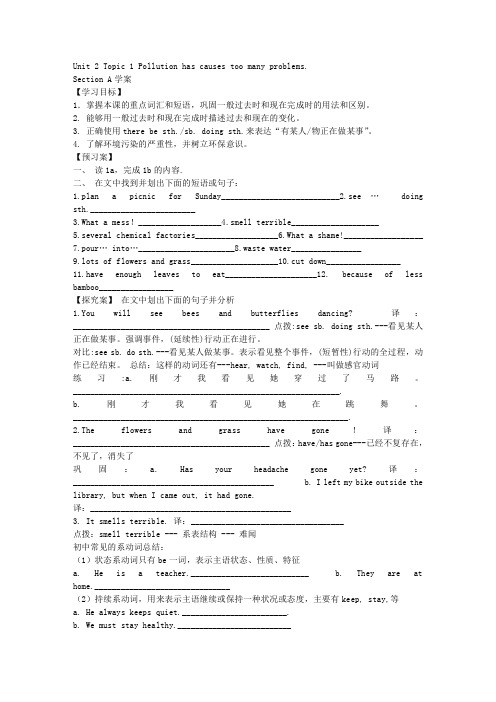
Unit 2 Topic 1 Pollution has causes too many problems.Section A学案【学习目标】1.掌握本课的重点词汇和短语,巩固一般过去时和现在完成时的用法和区别。
2. 能够用一般过去时和现在完成时描述过去和现在的变化。
3. 正确使用there be sth./sb. doing sth.来表达“有某人/物正在做某事”。
4. 了解环境污染的严重性,并树立环保意识。
【预习案】一、读1a,完成1b的内容.二、在文中找到并划出下面的短语或句子:1.plan a picnic for Sunday___________________________2.see…doing sth.________________________3.What a mess!___________________4.smell terrible____________________5.several chemical factories___________________6.What a shame!__________________7.pour… into…______________________8.waste water________________9.lots of flowers and grass____________________10.cut down_________________11.have enough leaves to eat_____________________12. because of less bamboo_________________【探究案】在文中划出下面的句子并分析1.You will see bees and butterflies dancing? 译:_____________________________________________ 点拨:see sb. doing sth.---看见某人正在做某事。
Unit 2Topic 1 Pollution has caused too many proble 2
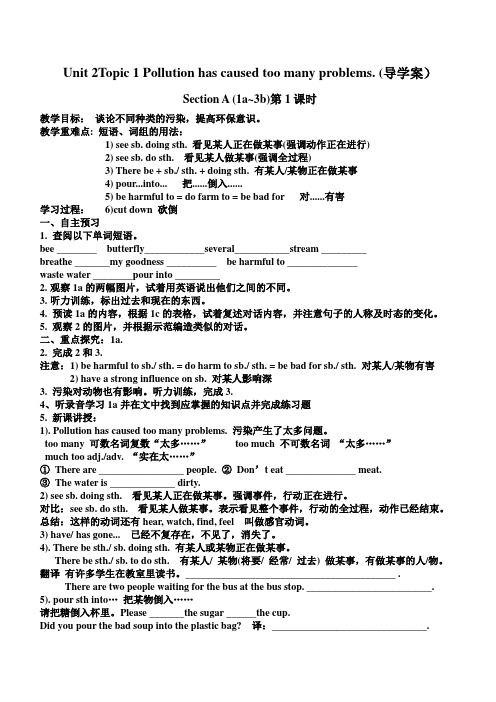
Unit 2Topic 1 Pollution has caused too many problems. (导学案)Section A (1a~3b)第1课时教学目标:谈论不同种类的污染,提高环保意识。
教学重难点: 短语、词组的用法:1) see sb. doing sth. 看见某人正在做某事(强调动作正在进行)2) see sb. do sth. 看见某人做某事(强调全过程)3) There be + sb./ sth. + doing sth. 有某人/某物正在做某事4) pour...into... 把......倒入......5) be harmful to = do farm to = be bad for 对......有害学习过程:6)cut down 砍倒一、自主预习1. 查阅以下单词短语。
bee ________ butterfly____________several___________stream _________breathe _______my goodness __________ be harmful to ______________waste water ________pour into _________2.观察1a的两幅图片,试着用英语说出他们之间的不同。
3.听力训练,标出过去和现在的东西。
4. 预读1a的内容,根据1c的表格,试着复述对话内容,并注意句子的人称及时态的变化。
5. 观察2的图片,并根据示范编造类似的对话。
二、重点探究:1a.2. 完成2和3.注意:1) be harmful to sb./ sth. = do harm to sb./ sth. = be bad for sb./ sth. 对某人/某物有害2) have a strong influence on sb. 对某人影响深3. 污染对动物也有影响。
听力训练,完成3.4、听录音学习1a并在文中找到应掌握的知识点并完成练习题5. 新课讲授:1). Pollution has caused too many problems. 污染产生了太多问题。
仁爱英语九年级Unit2 Topic1教案
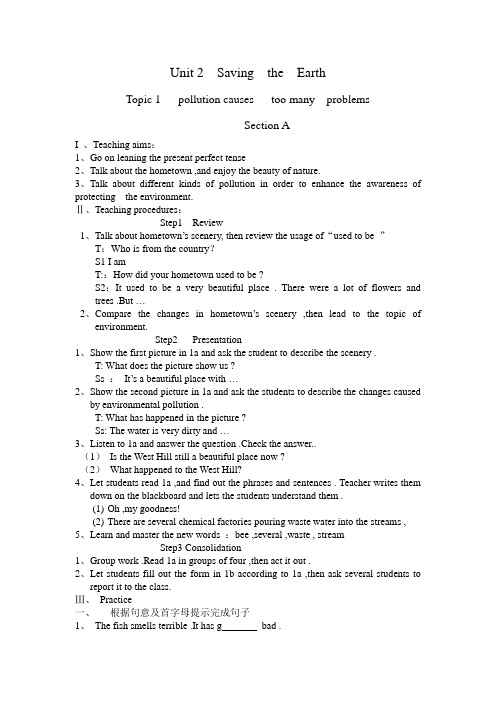
Unit 2 Saving the EarthTopic 1 pollution causes too many problemsSection AI 、Teaching aims:1、Go on leaning the present perfect tense2、Talk about the hometown ,and enjoy the beauty of nature.3、Talk about different kinds of pollution in order to enhance the awareness of protecting the environment.Ⅱ、Teaching procedures:Step1 Review1、Talk about hometown’s scenery, then review the usage of“used to be ”T:Who is from the country?S1 I amT::How did your hometown used to be ?S2:It used to be a very beautiful place . There were a lot of flowers and trees .But …2、Compare the changes in hometown’s scenery ,then lead to the topic ofenvironment.Step2 Presentation1、Show the first picture in 1a and ask the student to describe the scenery .T: What does the picture show us ?Ss :It’s a beautiful place with …2、Show the second picture in 1a and ask the students to describe the changes causedby environmental pollution .T: What has happened in the picture ?Ss: The water is very dirty and …3、Listen to 1a and answer the question .Check the answer..(1)Is the West Hill still a beautiful place now ?(2)What happened to the West Hill?4、Let students read 1a ,and find out the phrases and sentences . Teacher writes themdown on the blackboard and lets the students understand them .(1)Oh ,my goodness!(2)There are several chemical factories pouring waste water into the streams , 5、Learn and master the new words :bee ,several ,waste , streamStep3 Consolidation1、Group work .Read 1a in groups of four ,then act it out .2、Let students fill out the form in 1b according to 1a ,then ask several students toreport it to the class.Ⅲ、Practice一、根据句意及首字母提示完成句子1、The fish smells terrible .It has g bad .2、We have a lot of work to do every day ,We are as busy as a b3、The river isn’t clear now because the factory has p much w water into it4、Playing computer games too much can i your study5、Pollution c too many problems二、单项选择1、We it with our noses ,A、smellB、lookC、soundD、taste2、population can cause troubleA、much tooB、Too muchC、FewD、Too many3、Basketball is so popular a game in the world that people play it for fun and exerciseA、millions ofB、million ofC、millionsD、two millions of4、There is a man you at the school gate now .A、is waitingB、waitingC、waiting forD、waits5、You will see bees and butterfliesA、to danceB、to be dancingC、dancedD、dancing6、It’s a beautiful place lots of flowers .A、withB、haveC、to haveD、hasⅣ: Teaching reflectionUnit 2 Saving the EarthTopic 1 pollution causes too many problemsSection BThe main activities are 1a and 1b.Ⅰ. Teaching aims and demands1. Learn some new words:weak, produce, chest, anyway2. Go on learning direct speech and indirect speech:(1) The old lady said that it was difficult for her to breathe.(2) The old lady told Kangkang that she had been like that since the week before.(3) Kangkang asked the old lady how long she had been like that.(4) The journalist asked Mrs. Zhou whether/if she was feeling better then.(5) The journalist asked what the environment around that place was like.3. Learn some expressions about blame and complaint:(1) It’s difficult for me to breathe.(2) The bad air makes my chest hurt.(3) …the factory makes too much noise and I can’t sleep well at night.(4) I’m always in a bad mood …(5) …I can’t stand the environment here.(6) Anyway, I hope the government will solve this problem soon.Ⅱ. Teaching proceduresStep 1 Review (时间:5分钟)Check over students, homework. Review direct speech and indirect speech by:T: Is there air pollution around your home?S1: Yes. There are several chemical factories near my home. They make terrible gas. I often feel sick.T: What did S1 say just now?S2: S¬1 said that there were several chemical factories near his/her home.S3: S1 said that they made terrible gas.S4: S1 said that he/she often felt sick….Step 2 Presentation (时间:12分钟)1. lead _ inT: From 1a, Section A, we know Kangkang and his friends planned to go for a picnic. But two days later, when the children reached the West Hill, would they have a picnic there?Ss: No.T: Why?Ss: The flowers, grass and fish have gone. The chemical factories are pouring waste water into the stream.T: And what is the factory making?Ss: It’s making smoke.T: Yes, it’s producing smoke. It’s producing terrible gas. (教师做捂鼻皱眉状。
仁爱版九上 Unit2 Topic1 Pollution causes too many problems
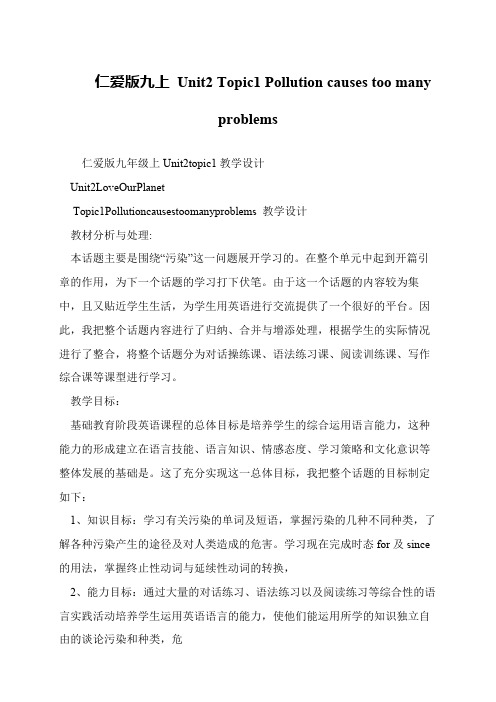
仁爱版九上Unit2 Topic1 Pollution causes too many
problems
仁爱版九年级上Unit2topic1教学设计
Unit2LoveOurPlanet
Topic1Pollutioncausestoomanyproblems 教学设计
教材分析与处理:
本话题主要是围绕“污染”这一问题展开学习的。
在整个单元中起到开篇引章的作用,为下一个话题的学习打下伏笔。
由于这一个话题的内容较为集中,且又贴近学生生活,为学生用英语进行交流提供了一个很好的平台。
因此,我把整个话题内容进行了归纳、合并与增添处理,根据学生的实际情况进行了整合,将整个话题分为对话操练课、语法练习课、阅读训练课、写作综合课等课型进行学习。
教学目标:
基础教育阶段英语课程的总体目标是培养学生的综合运用语言能力,这种能力的形成建立在语言技能、语言知识、情感态度、学习策略和文化意识等整体发展的基础是。
这了充分实现这一总体目标,我把整个话题的目标制定如下:
1、知识目标:学习有关污染的单词及短语,掌握污染的几种不同种类,了解各种污染产生的途径及对人类造成的危害。
学习现在完成时态for及since 的用法,掌握终止性动词与延续性动词的转换,
2、能力目标:通过大量的对话练习、语法练习以及阅读练习等综合性的语言实践活动培养学生运用英语语言的能力,使他们能运用所学的知识独立自由的谈论污染和种类,危。
九年级英语上册Unit2Topic1Pollutionhascausedtoomany
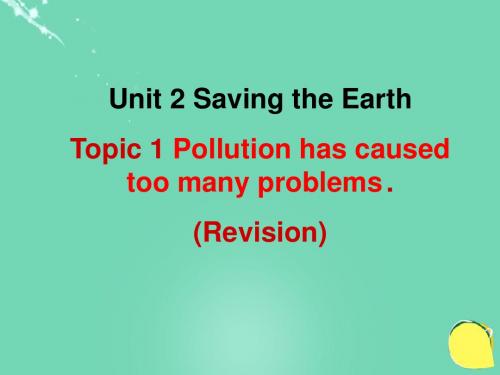
air pollution
light pollution
litter
water pollution soil pollution noise pollution
water pollution
On Sunday, Kangkang went to the West Hill. What a _____! Everything has___________ . The water is so ___________. It __________terrible. The flowers and grass have _______. What’s _________, he has ________ the dead fish in the river. What has ________ there? There are several factories _________ waste water________ the stream.The factories have_________ the rivers and lakes. So water pollution is almost _________in China.
Simple past 强调过去
They are caused by pollution.
The flowers and grashsa_v_e__g_o_n_e____
(go).
has changed
Everything _____________ (change).
Present perfect 强调现在
Mrs. Zhouh_a_s_b__e_e_n_____ (be) like this since last week.
Unit 2 Topic 1Pollution causes too many problems

Retell the questions like this: Kangkang asked the old lady …
How long have you been like this?
2. Work alone
The chemic3al factory produces terrible gas and
the bad air makes my chest hurt.
Maria:
What did they say next?
The journalist asked
2 . what the environment around
Retell the questions like this: Kangkang asked the old lady…
How long have you been like this? Kangkang asked the old lady how long she had been like that.
What did she say?
The bad air makes my chest hurt.
She said that the bad air made her chest hurt.
What did she say?
The factory makes too much noise and I can’t sleep well at night.
Retell the questions like this: Kangkang asked the old lady …
Unit 2 Topic 1 Pollution has caused too many probl

Unit2 Topic1 Pollution has caused too many problems.单词检测1 ________________ n.蜜蜂2 ________________ n.蝴蝶;蝶泳3 ________________ n.肮脏,杂乱;困境4 ________________ n.羞耻,羞愧=pity5 ________________ det.&pron.几个,数个= a few6 ________________ v.倒出;倾泻;不断流出7 ________________ adj.废弃的n.废料v.浪费8 ________________ n.村民,乡下人9 ________________ v.破坏,毁坏10 ________________ 砍倒11 ________________ v.污染12 ________________ n.天哪;啊呀13 ________________ v.呼吸14 ________________ n.疼,痛,痛苦15 ________________ n.生产,制造16 ________________ n.胸部,胸膛17 ________________ adj.很坏的,极讨厌的18 ________________ v.承受,忍受n. 熊19 ________________ n.主编,编辑20 ________________ n.土壤,土地21 ________________ adj.有害的22 ________________ adj.聋的23 ________________ v.印刷24 ________________ n.听力,听觉25 ________________ n.丧失,损失,丢失课下注释小练1 bee n.蜜蜂2 butterfly n.蝴蝶;蝶泳3 mess n.肮脏,杂乱;困境4 shame n.羞耻,羞愧=pity5 several det.&pron.几个,数个= a few6 pour v.倒出;倾泻;不断流出7 waste adj.废弃的n.废料v.浪费8 villager n.村民,乡下人9 destroy v.破坏,毁坏10 cut down 砍倒11 pollute v.污染12 goodness n.天哪;啊呀13 breathe v.呼吸14 pain n.疼,痛,痛苦15 produce n.生产,制造16 chest n.胸部,胸膛17 awful adj.很坏的,极讨厌的18 bear v.承受,忍受n. 熊19 editor n.主编,编辑20 soil n.土壤,土地21 harmful adj.有害的22 deaf adj.聋的23 print v.印刷24 hearing n.听力,听觉25 loss n.丧失,损失,丢失26 disturb v.打扰;扰乱二、词组1.计划一次野炊 1.plan a picnic2.几家化工厂 2.several chemical3.把…倒入… 3.pour…into4.难闻 4. smell terrible5.砍倒太多树 5.cut down too many trees6.污染海洋 6.pollute the ocean7.吵闹,制造噪音7.make noise8.情绪不好8.be in a bad mood9.忍受这里的环境9.stand the environment here10.写信给… 10.write to11.排放可怕的气体11.produce terrible gas12.睡得好12.sleep well13.太多(两种) 13. too many, too much14.太14.much too15.对…有害处15.be harmful to16.变聋16.go deaf17.相当多17.quite a lot18.和……一样坏18.no better than19当众(地),公开(地) 19. in public20.一种20.a kind of21.多种多样21.all kinds of22.打扰别人22.disturb others23.乱扔垃圾23.throw litter around24.在很多方面24. in many ways25.包括土壤污染25.include soil pollution三、句型1.花和草不见了. 1. Flowers and grass have gone.2.有几家化工厂把废水倒进小溪里了 2.There are several chemical factories pouring waste water into thestream.3.一切都变了. 3.Everything has changed4.这里发生什么事? 4.What has happened here?5.真是一团糟啊! 5.What a mess!6.真可惜,真遗憾! 6.What a pity!7.你病了多久了. 7.How long have you been like this?8.我病了一个月了8.I have been ill for a month.9.污染导致了太多的问题9.Pollution has caused too many problems10.而且,另外. 10.What’s more11.更糟的是, 更有甚者. 11.What’s worse12.光污染对眼睛有害处. 12.Light pollution is harmful to eyes13.工厂产生巨大的噪音,我晚上睡不好13.The factories produce too much noise and I can’t sleep well at night.14.我不能忍受这里的环境I can’t stand the environment here.15.我希望政府很快解决这个问题15.I hope the government will solve the problem16.不是所有人知道噪声也是一种污染16.Not all the people know noise is also a kind of pollution.17.当众发出巨大的噪声也是一种污染17.Making too much noise in public is also a kind of pollution课后培优练培优第一阶——基础过关练一、单词填空1.The old man is d_________. He can’t hear anything.2.It’s a w________ of money buying a new car when we could repair the old one.3.She’s won many world competitions, ________ (包括) four gold medals in the Olympics.4.After the game, all the students are out of ________ (呼吸).5.________(近期), a finding by Chinese scientists says that usable water could be found on Mars. 6.Smoking is ________ (有害的) to health. Ask your father to give it up, please.7.Can you use the colours to ________ (创造) a warm and comfortable feeling now?8.Look! There are ________(几个)students playing in the playground.9.Cold weather makes me very ________(不舒服).10.—Hi, Kristin! How was your trip to Beijing?—It was _________ (很坏的). I caught a bad cold as soon as I got there.二、用所给单词适当形式填空11.It is _____ (harm) to the environment to kill the wild animals.12.He felt ________ (comfort) with that man, so he left his seat.13.Don’t ________ (waste) time. You should work hard at your lessons.14.“I can do it.”, she ________ and went away confidently. (breath)15.It is a pity that the TV set I have bought ________ (recent) doesn’t work.16.We’ve got a five-day holiday ____ (include) Sunday.17.People are trying their best to stop water ________ (pollute).18.There was a(n) _________ (please) smell in the fridge because my mom kept the food in it for a long time. 19.I look forward to ________ from you in the near future.(hear)20.I often discuss __________ (environment) problems in our city with my classmates.21.The enemy bombs caused death and _________ (destroy) lots of houses.22.Working underneath the car is always a ________ (mess) job.23.________ (breathe) fresh air and taking a jogging every day are good for us.24.Try your best _________(create) a wonderful future.25.The girl was refused by the manager and was filled with a sense of ________ (lose).三、单项选择26.Some kinds of animals are in great danger because people ________ too many trees.A.cut down B.cut out C.cut up27.—David, don’t watch TV for a long time. It ________ your eyes.—OK, Dad. I’ll turn it off.A.is good for B.does well in C.is harmful for D.does harm to28.In the past, we ________ got information from paper books, but now we usually search for information online. A.likely B.mainly C.recently D.suddenly29.He showed some ________ examples to make the science report easy to understand.A.awful B.serious C.proper D.thick30.Don’t play the cellphone all day. It’s _________ to your eyes.A.useful B.helpful C.harmful D.harm31.Don’t make so much ______. I have a bad headache.A.pain B.noise C.voice D.music32.—Look at your room, Nick! What a terrible ________!—I’m sorry, Mom. But I can’t find my ID card anywhere.A.mess B.habit C.waste D.accident33.—Watching TV is a ________ of time.—I disagree. Sometimes it makes me relaxed.A.kind B.number C.waste D.use34.—We should learn from Zhang Guimei, one of the “People Who Moved China”.—Yes. She ________ the first free high school for girls in mountain areas and has helped more than 1800 students to go to college.A.deleted B.created C.swung D.reflected35.Although it is ________ to wear a helmet for a long time, it can protect your head.A.special B.uncomfortable C.crowded D.unsure四、完成句子36.雾霾天气不仅伤害人们的健康,也影响公共交通安全。
最新Unit 2Topic1 Pollution causes too many problems资料

Unit 2Topic1 Pollution causes too many problems:SectionA一. 在文中找到并划出下面的短语1.计划一次野餐_____________________2.砍伐__________3.几个化工厂________________________4.两天后_______________5.多么脏啊!____________6.难闻______________7.把…倒入… ______________ 8.大量使用化学药品_________________9.过去________________ 10.听力散失________________11.对……造成伤害____________________ 19.使人们感到不舒适__________________20.呼吸困难_________________________ 21.做一些有用的事___________________22.对眼睛有害_______________________ 23.在吵杂的条件下___________________三. 在文中划出下面的句子并分析1.You will see bees and butterflies dancing? 译:_______________________________点拨:see sb. doing sth.---看见某人正在做某事。
强调事件,(延续性)行动正在进行。
对比:see sb. do sth.---看见某人做某事。
表示看见整个事件,(短暂性)行动的全过程,动作已经结束。
总结:这样的动词还有---hear, watch, find, feel---叫做感官动词练习:a.刚才我看见她穿过了马路。
__________________________________________b.刚才我看见她在跳舞。
______________________________________________2.The flowers and grass have gone!译:_____________________________________点拨:have/has gone---已经不复存在,不见了,消失了巩固:a. Has your headache gone yet? 译:____________________________________b. I left my bike outside the library, but when I came out, it had gone.译:_______________________________3. It smells terrible. 译:__________________________________________点拨:smell terrible --- 系表结构--- 难闻初中常见的系动词总结:(1)状态系动词只有be一词,表示主语状态、性质、特征a. He is a teacher.________________________b. They are at home._______________________________(2)持续系动词,用来表示主语继续或保持一种状况或态度,主要有keep, stay, remain等a. He always keeps quiet._________________b. We must stay healthy._________________(3)表像系动词,用来表示“看起来像”这一概念,主要有seem, appear, look等。
初三仁爱上册Unit2Topic1课文翻译填词

初三仁爱上册Unit2Topic1课文翻译填词Topic 1:Pollution has caused too many problems混浊已经造成太多标题。
Section A译文1a简和玛丽亚:康康,我们要去哪里?Kangkang, we go ?康康:西山怎么样?我以前往过那里。
那里是一个有很多花花草草的美丽的地方,空气清新,流水清亮,你将会看到蜜蜂和蝴蝶在翩翩起舞。
the West Hill? I've there before. It's a beautiful place lots of flowers and grass. The air is fresh and the water is clean, and you will see bees and butterflies dancing.迈克尔:听起来很好!让我们去那里吧!! Let's go there.(两天后,他们来到西山了)Two days later, they come to the West Hill康康:哦,我的天哪!花花草草全没了,流水这样污秽,臭气熏人。
这里产生了什么?Oh, my ! The flowers and grass have ! The water is so . It smells . What here?玛丽亚:看,有几家化工厂正在往小溪排放废水。
Look, there are chemical pouring waste water into the .康康:一切都变了。
Everything has .迈克尔:你们仍然要在这里举行野炊吗?Do you still want to here?简:固然不。
Section B译文1a(一个老太太正在咳嗽,她看起来虚弱)An old lady is coughing. She looks .康康:早上好,老奶奶。
你有什么事吗?Good morning, Granny. with you?老太太:哦,孩子,呼吸对我来说有困难。
- 1、下载文档前请自行甄别文档内容的完整性,平台不提供额外的编辑、内容补充、找答案等附加服务。
- 2、"仅部分预览"的文档,不可在线预览部分如存在完整性等问题,可反馈申请退款(可完整预览的文档不适用该条件!)。
- 3、如文档侵犯您的权益,请联系客服反馈,我们会尽快为您处理(人工客服工作时间:9:00-18:30)。
;
模块一:温故知新
模块二:自主学习 (独立进行)预时20分钟(Self-study & Self-exploration)
模块三:交流研讨 (小组交流、合作、展示)预时35分钟(Cooperation ,Exploration &Show)
模块四:教师精讲(预时7分钟,认真听讲并记录要点)
模块五:当堂训练(预时20分钟)
一、单项选择。
( ) 1. The teacher asked me ______
A. that I could answer the question.
B. whether could I answer
the question.
C. whether I could answer the question.
D. if I can answer the question.
( ) 2.If you want to catch the first bus, you had better ______ early.
A. to get up
B. got up
C. getting up
D. get up
( ) 3.He asked me, “ ______”
A. What are you doing when Tom leaves?
B. What you are doing when
Tom leaves?
C. What were you doing when Tom leaves?
D. That what you were doing when Tom left.
( ) 4. I’m not sure ___ to call him or not.
A. if
B. whether
C. that
D. weather
( ) 5. He asked Lucy if she could swim. He asked Lucy, “ ____”
A. If she could swim.
B. Can you swim?
C. Could you swim?
D. Can I swim?
( )6. –How long have you known him? –I’ve known him ______.
A. two years ago
B. since last year
C. two years
D. in
two years
( ) 7. – Why did Miss Wang look so worried? – Because she wondered ______
A. where did the other students go
B. when would the policeman come
C. what her students have done during the trip
D. if her students had
arrived safely
( ) 8. –The milk has gone sour. -- _______ We’ll have no milk for tomorrow’s
breakfast.
A. I’m pleased to hear that.
B. Don’t mention it.
C. That’s
too bad. D. Of course not.
( ) 9. The doctor looked over the little girl again and again, but still he
couldn’t find out ______.
A. what wrong is with her.
B. what wrong was with her.
C. what is wrong with her
D. what was wrong with her
二、将下列直接引语和间接引语相互转换。
1. “ I often play the piano.” Tina said.
Tina said __________________________________________
2. “Did you write to your friend yesterday?” he asked me.
He asked me ________________________________________
3. “ Don’t disturb me.” he said to his brother.
__________________________________________________
4. Mary asked me if I was reading books.
“ _________________________” Mary asked me.
【学生自主反思】(写出今日一得和今日不足)
今日一得
今日不足 ___。
